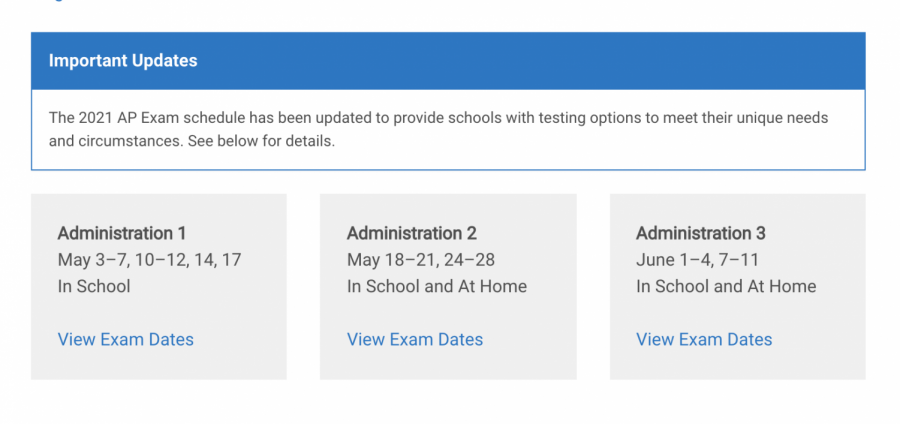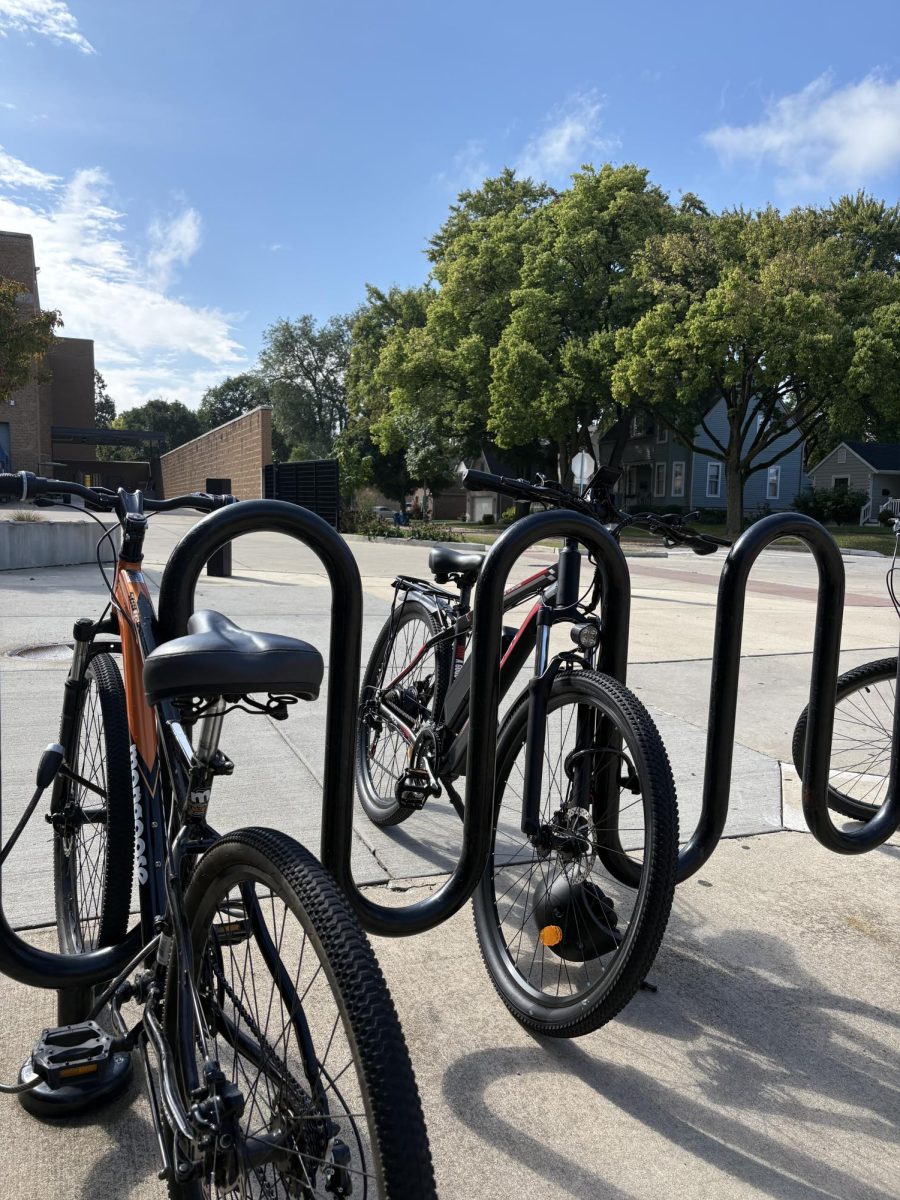AP students, teachers address difficulties of choosing exam format this year
ADMINISTRATION DATES: the dates that online and in-person AP tests will be administered.
March 17, 2021
Last May, a $500 million class action lawsuit was filed by students across California against the College Board, the most prominent organization making standardized tests for high schoolers. The students were frustrated from taking a digital version of the normally in-person Advanced Placement (AP) exams as they faced technology issues and many weren’t able to submit parts of their exam. The temporary transition to an online format was caused by the social distancing restrictions set due to the COVID-19 pandemic.
This year, as conditions in the pandemic improve and restrictions decrease, the College Board has created both in-person and online AP exams for students to take. The District 99 administration has allowed students to choose from the two options, with the default choice being the in-person exam. Apart from the overarching COVID-19 health concerns many students must consider for themselves and their families, students must review other factors when choosing their exam format including potential technological complications, administrative scheduling and more. Although students may initially conclude that the unproctored digital version of the exams would be the obvious choice, the two test formats have design differences that pose advantages and disadvantages on both sides.
Potential cheating
The purpose of AP exams is to provide students a standardized platform by which their level of understanding for college-level content of a specific course can be assessed; if a student passes an exam, they have a chance of getting college credit depending on which school they attend. Therefore, maintaining the integrity of the AP exams is one of the College Board’s most important priorities. If students could cheat through the test and pass without actually understanding the content of the course, colleges would stop giving students credit for AP exams and the College Board’s business would be at stake.
For the remote exams, although testing at home may allow students to search up answers online, it may not be so simple.
“After talking to several administrators at school, it is not going to be easier to take it at home. With it being a timed test, if you don’t know something you’re not going to have the time to look it up. If you start doing that, you’re not going to finish the test,” AP Psychology teacher Carrie Roberts said.
Structural differences
The first major design difference between the in-person and online formats of the AP exams is the structure of answering questions. The normal paper-pencil format of the test allows students to go back and forth between multiple choice questions. In the digital version of the exam, once a student answers a question, they won’t be able to go back and change their answers.
For some students, this ability to check back on previous questions is an automatic test-taking strategy. However, this won’t be available with the remote version of the exams.
“Sometimes as you take a test, things come to you or you get new insight or something triggers a memory. Then you remember something 20 questions back but if you’re doing it digitally, it’s very rigid and you can’t go back, which makes it harder,” Roberts said.
Similar to multiple choice questions, students will not be able to go back and forth between free response questions, such as essays.
“For the traditional paper/pencil test, the student will have the ability to… write essay responses out of order if that’s the best strategy for them…In contrast, College Board has explicitly said that the ability to skip questions will not be available on the digital version of the exams,” AP English Language teacher Alexa Harris said.
Administrative scheduling
The scheduling for the in-person and remote exams have been separated into three administrations blocks. The in-person exams will take place throughout the first two weeks of May while the remote exams will stretch into early June.
On one hand, students may not like taking their exams after the school year has already ended.
“I just want to get the exams done during the school year, when I still have the content fresh in my head. I don’t really want to wait [until] the summer,” junior Megan Thompson said.
On the other hand, the remote exams scheduled a few weeks later may allow students more time to study and prepare.
“The remote option is offered an entire month later than the in-person one. We can get a lot more content, review, and practice accomplished in that month so perhaps students would be more prepared for the test if they took it in June, even if it was a more difficult exam than the in-person one,” AP Chemistry teacher Megan Marrs said.
Technological complications
However, taking the exam online can introduce technological complications based off of a student’s internet quality, level of tech savviness, and other factors.
“In spring 2020 when all students were required to take AP exams digitally, I had numerous students experience tech issues that caused them a lot of stress — one or two even had to scratch the whole test and take a make-up exam at a later date,” Harris said.
The inherent risk of taking the exams digitally has caused some students to commit to the in-person exams.
“I feel like the paper version of the exam will allow me to showcase my knowledge the best. Without the potential for any technology mishaps, as well as simply being able to take the exam in a traditional way that I am used to, the paper exam will be what I choose,” senior Jesse Wei said.
Different grading scale?
Another significant difference between the two formats is the, potentially, more difficult grading of the remote version.
“My students last year took the test remotely and from the small sample I looked at, the remote exam was scored harshly. Students that took their time and didn’t complete all of the exam (or at least as much as their classmates had) were heavily penalized,” Marrs said.
Although the College Board has said that they are keeping the difficulty of both formats the same, there are reasonable speculations behind a harsher scale for the remote exam.
“My best guess is that students who didn’t finish as much of the exam as other students were thought to have used some of their time looking up answers in their notes (or online) and were ‘penalized’ for that. However, some students are just slower test takers,” Marrs said.
Other factors
For both remote and hybrid students, more class assignments have shifted to the online format where responses are written instead of typed. The lack of practice in writing by hand has some students reasonably concerned about their efficiency with in-person exams.
“As far as my AP Lang test, though, I am still debating which option I want to take… as ridiculous as it may sound, I’m worried about my hand strength when it comes to writing three essays on paper. All year, I’ve typed my assignments digitally, and I’m much faster at typing, so I worry that I might perform as well on the paper version. So, this is an exam that I am considering taking digitally,” junior Madeline Riske said.
A few exams this year aren’t offering a remote version at all, which is important for students to note as well.
“One of the exams I’m taking —the Spanish exam — you have to go in-person to take that one. So I do have multiple exams on the same day as the language one so that’s pushing me towards [in-person testing]. If I’m already there in the building, I might as well take the other ones there as well,” Thompson said.
To conclude, there are pros and cons in both the in-person and the remote formats of AP exams this year. Students and their families will have to see which option is more advantageous for them, and it may be a different scenario for each student. Putting predictions on the side, only time will tell how AP exams will go this year.
“I think the most important thing to remember is that this year was incredibly challenging for everyone… I know the scores you get on your AP Exams seem super important right now, but in 3 or 4 years they become sort of meaningless… in my opinion, when I look at the students I teach this year and see how well they’ve adapted to this environment, I know they are going to be extremely successful adults-no matter what life throws at them,” Marrs said.
























